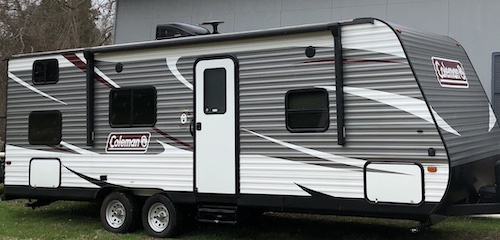Camper Rental for Income
Have you considered camper rental for income? If you could rent out your camper or RV for income, wouldn’t that be fantastic? It sounds great, but there are some things you should consider before you get too excited about it.
First, if you are still paying for your camper or RV, your lender may not allow you to rent it out. They probably consider renting to be a commercial activity and you probably financed it for personal use. If this is your situation, you have two options.
You could pay it off with a different loan or debt so that the title comes to you. Or if you can’t pay it off, you could setup a business and finance it for commercial use.
Consider Your Location for Renting Your Camper
Do you live near an area where people like to camp?
To make the most of your camper rental business, you want to find out what your market is like.
Investigate what campgrounds are nearby. Also consider what draws people to your area.
To give you an example, I live near Charlotte, NC.
The attractions in my area include the Charlotte Motor Speedway and NASCAR racing. Not far away, we have Carowinds theme park.
There are also rivers and large lakes nearby, such as High Rock Lake and Lake Norman. I found out that one of the campgrounds near me has wonderful reviews with lots of things to do for families with children.

The high season for my area is from April to November. Off season possibilities for camper rentals include weddings and extra space for hosting holiday family gatherings. In both cases, people might book an RV or camper to park at their home as extra accommodations for guests.
Consignment Camper Rental or Owner Hosting
As you consider camper rental for income, think about the day to day management tasks. Do you have the ability to serve customers yourself? Can you deliver the camper or RV to your renter’s campsite of choice? Or do you need to outsource that to someone else?
The work involved in the camper rental business is very much like the work involved with AirBnB-type home rentals. Customer service is an important factor for success. A successful camper rental for income production depends on good customer service and attention to details.
If you can engage with your customers, deliver your camper or RV to their desired location, and do the inspections and cleanup afterwards, then you can setup a business as an RV/Camper Rental business. If this sounds like you, take a look at the Outdoorsy.com or RVshare.com websites to learn more about the camper rental business.

These websites provide a platform for advertising your business to prospective renters. They charge a fee for handling the scheduling and transaction details for you. You’ll need to have insurance to cover damages a renter might cause to your property.
If that sounds like too much work for you, then you will want to place your camper with a consignment rental company. You can book the times you want to use your camper and let other people use it when you’re not. The rental company handles all the customer management and sends you a check for your share. In my area, Thomas RV Rentals is an example of a company that does consignment rentals.
Small Downsides to a Camper Rental for Income Business
There are a few downsides to renting out your camper. The first one is that you will need to decide what personal property you need to take out of it. You probably have it stocked with all the stuff your family usually uses on a camping trip. If you will rent it out, you have to move all that out.
Then you need to decide what supplies you will provide for your
temporary tenants. Will you provide dish washing supplies, towels,
sheets, and dishes? Study the offerings on camper rental websites to see
what other owners do. Then be sure to describe what you will and won’t
provide to your renters.
Another downside is that occasionally
your camper will be returned with damage of some kind. You will need to
discover this immediately upon receiving it back. If you delay, you
could lose the opportunity to file an insurance claim. So you’ll need to
be on top of things before and after your camper goes out.